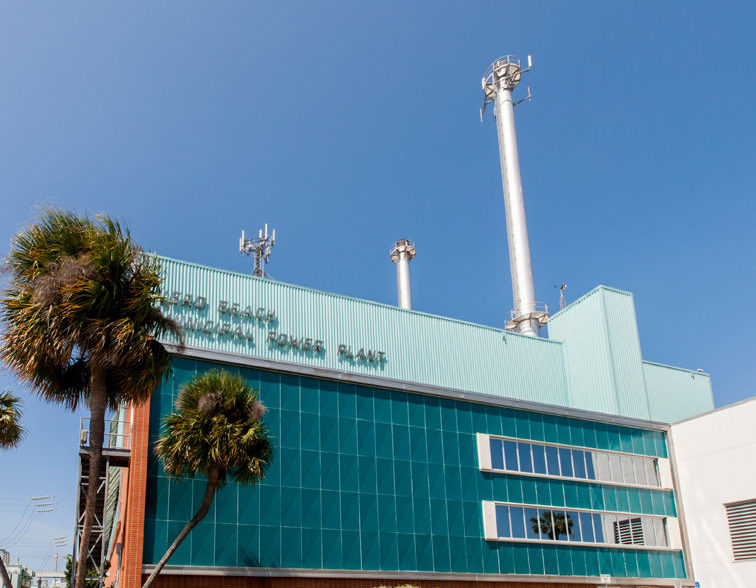
Six impressive law firms want to represent the City of Vero Beach in the sale of the Indian River Shores portion of its electric system to Florida Power & Light for $30 million, but Mayor Laura Moss says it’s too soon to lawyer up. In a unanticipated move, she plans to oversee negotiations herself for the time being.
“Once you hire an attorney, it’s like stepping into a taxicab, the meter starts running,” Moss told Vero Beach 32963 when she received an 82-page packet of proposals from prospective legal counsel.
The first priority, Moss said, is getting a clear fix on the complex technical aspects of partitioning the electric system. “City Manager Jim O’Connor and [Electric Utility Director] Ted Fletcher are already working on that with FPL, they started on that the very next day after we approved the letter of intent to sell,” Moss said.
Councilmen Tony Young and Dick Winger had raised concerns about a clause in the document stating that Vero would be responsible for costs on the city’s end of knitting the utility infrastructure back together after the Shores is severed from the system.
“The technical aspects take precedence. We need a full understanding of all the technical requirements before engaging the services of an attorney,” Moss said. “When we have the meeting on Jan. 3, no interviews will be conducted and none of the attorneys have been invited to be present. In this preliminary stage, while we’re getting the technical aspects worked out, I feel I can advocate for what the city wants out of the deal without an attorney.”
FPL has promised it will come back with a purchase and sale agreement by the end of March, hoping to close the deal by Dec. 31. “When it comes time to draft that document and work out the final legal details, and we need to get the approval from the Florida Public Service Commission, that’s when we’ll need an attorney on board and up to speed,” Moss said.
“I’m trying to accomplish this in the most efficient and cost-effective manner,” Moss added, noting that Vero electric customers have already paid massive legal fees to date during the various court and regulatory disputes surrounding the utility.
Shortly after being seated post-election, the newly-constituted council voted to move toward a sale of the Shores portion of the system – within the context of an eventual full sale of Vero electric to FPL.
A majority of the council then voted to fire its utility attorney Robert Scheffel “Schef” Wright due to a lack of confidence that he could wholeheartedly represent the city in the sale, an action he had opposed.
Wright and consultant Bill Herrington had told the previous City Council that the price to make the city “whole” for 30 to 50 years after a sale of the Shores customers was $67 million, then $64 million and finally $47 million.
Even if Moss is successful in convincing her four colleagues on the dais that she’s adept enough to negotiate for the city for the time being, the reality is that Vero will need an attorney to complete the partial sale, to make sure the city does not run afoul of tax-free municipal bond covenants and to navigate the approval of the sale and the amendment of service territories by the PSC.
So far, only Nathaniel Dolinger of the Tampa office of the Carlton Fields law firm has been interviewed for the job. Council members were very impressed by his experience and his knowledge of complex transactions in the utility industry – specifically the sticky act of selling part of a municipal electric utility to an investor-owned utility.
Vice Mayor Harry Howle, who brought Dolinger to the attention of the council, cited the attorney’s involvement in the purchase of the Sebring electric transmission system by Florida Power Corporation. “He’s the only guy who has done this before,” Howle said.
Among the five other law firms who have applied, there are some familiar names and faces.
John Igoe and Richard Miller of the Locke Lord law firm toiled away in the effort to sell the entire utility for a couple of years until they met with the brick wall of the Florida Municipal Power Agency, whose officials refused to deal them.
The FMPA said they preferred to deal with Wright, so the council – then led by Winger – ditched Igoe and Miller for Wright. But Wright got nowhere on the sale, either. With a new council on board, fervent to re-ignite efforts to sell the whole system, Igoe and Miller want another crack at the job.
Thomas Cloud of the Gray Robinson law firm has worked as legal counsel to GAI Consultants, a firm used by both Vero and Indian River Shores, back when Vero commissioned an appraisal of its electric utility and an optimization study of its water-sewer utility and the Shores was weighing whether or not it should stick with Vero for water, wastewater and reuse water or go with Indian River County Utilities.
The rest of the applicants are new to Vero’s electric saga, except that most of them applied for the job of representing the city in August 2011 when Igoe and Miller were chosen. James Goodwin of McFarlane Ferguson, Gerald Buhr of Saxon Gilmore, and Nathan Nason of Nason Yeager all submitted exemplary qualifications in transactional law in the utility field.



